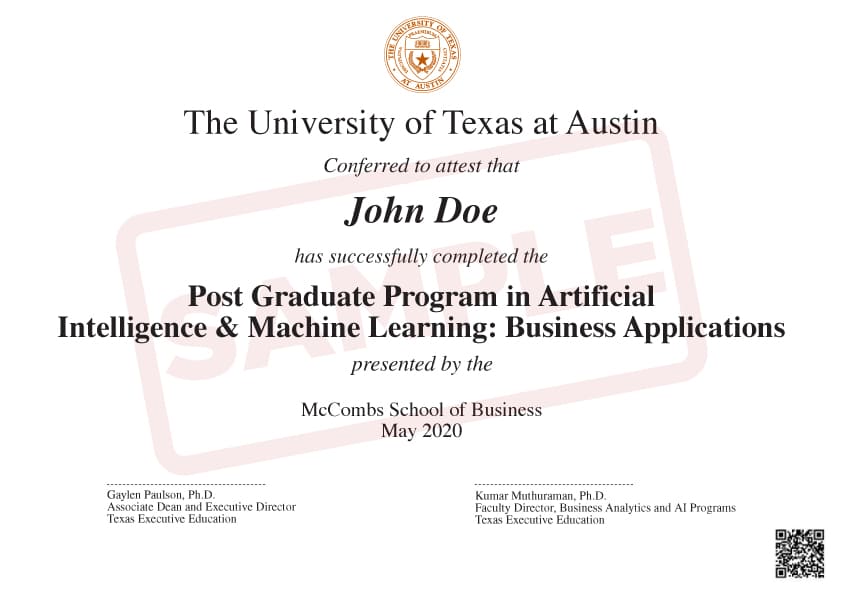Learn more about the course
Get details on syllabus, projects, tools, and more
Help us understand you better
What matters the most to you in an Artificial Intelligence & ML course?

Master Data Science & AI
Earn certificates in Both Data Science & AI
Application closes 29th Apr 2025
What’s new in this online course?
-

Flexible and Expert-Guided Learning Sessions
This online program combines academic rigor with flexibility, requiring no prior coding experience. Structured learning and mentorship from industry experts ensure steady progress and valuable insights.
-

Future-Ready AI and Deep Learning Skills
Gain cutting-edge Deep Learning expertise from the University of Texas at Austin, covering algorithms like Neural Networks, Computer Vision, and NLP. These in-demand skills prepare you for roles at top tech companies.
Program Outcomes
After completing this program, professionals will be able to
-
Provide actionable insights to stakeholders by presenting data-driven recommendations and visualizations.
-
Leverage analytics to drive business growth and lead organizational initiatives in data-driven transformation
-
Master the fundamentals of Artificial Neural Networks to uncover insights and solve complex business challenges.
-
Enable machines to understand human sentiment and language, and summarize conversations using NLP techniques.
-
Build models to predict future trends and use them to inform business strategy.
Earn certificates from UT Austin
Key highlights
Why choose this course in Data Science and AI?
-

Learn from world’s top university
Earn certificates from a world-renowned university, taught by the esteemed faculty of UT Austin
-

Industry-ready curriculum
Learn the foundations of Python, GenAI, and Deep Learning, gain valuable insights, and apply your skills to transition into AI roles
-

Learn at your convenience
Gain access to 600+ hours of content online, including lectures, assignments, and live webinars which you can access anytime, anywhere
-

10 Hands-on Projects
Get practical hands-on training with a 4-week Capstone project, case studies, and over 27 AI tools
-

Get expert mentorship
Interact with mentors who are experts in AI and get guidance to complete and showcase your projects
-

Personalized program support
Get 1:1 personal assistance from a Program Manager to complete your course with ease.
Skills you will learn
Python Foundations
Business Statistics
Supervised Learning
Ensemble Techniques
Unsupervised Learning
Generative AI
SQL
Neural Networks
Computer Vision
Natural Language Processing
Python Foundations
Business Statistics
Supervised Learning
Ensemble Techniques
Unsupervised Learning
Generative AI
SQL
Neural Networks
Computer Vision
Natural Language Processing
view more
Careers in Data Science & AI
-
11.5 Million
job Openings in Data Science by 2026
-
$103.5 Billion
The projected global business analytics market size by 2027
-
$415.4 Billion
is the projected deep learning market value by 2030
Careers in Data Science & AI
Here are the ideal job roles in AI & Data Science sought after by companies in the US:
-
Machine Learning engineer
-
Data Scientist
-
AI Research Scientist
-
Natural Language Processing (NLP) Engineer
-
Big Data Engineer
-
AI Product Manager
-
Robotics Engineer
-
Business Intelligence Developer
-
Generative AI (GenAI) Developer
-
AI Consultant
Our alumni work at top companies
- Overview
- Career Transitions
- Why GL
- Learning Journey
- Curriculum
- Projects
- Tools
- Certificate
- Faculty
- Mentors
- Reviews
- Career support
- Fees

Who is this ideal for
Professionals aspiring to empower their career with data science & AI
-
Young professionals
Early-career professionals looking to build expertise in the most widely-used Data Science & AI tools Technologies
-
Mid-senior professionals
Professionals who want to make data-driven decisions and drive key strategies across business functions
-
Project Managers
Mid-career executives looking to advance their careers in the Data Science & AI domain
-
Tech Leaders
Professionals who want to apply Data Science & AI skills to solve real-world business problems, drive innovation, and advance to managerial or leadership roles
Upskill with one of the best Data Science & AI courses
-
Great Learning Programs
Other Courses
-
Certification
 Certificates from UT Austin
Certificates from UT Austin No university certificate
No university certificate -
Gen AI modules
 Extensive coverage of Gen AI topics
Extensive coverage of Gen AI topics Limited coverage
Limited coverage -
Live mentored learning
 Live interactive online classes with industry professionals
Live interactive online classes with industry professionals  Limited to no live classes
Limited to no live classes -
Hands-on projects
 10+ lab sessions with 4 week capstone project
10+ lab sessions with 4 week capstone project Fewer projects and no capstone project
Fewer projects and no capstone project -
Program support
 Dedicated support to complete your course
Dedicated support to complete your course Limited support
Limited support
Experience a unique learning journey
Our pedagogy is designed to ensure career growth and transformation
-
Learn anytime, anywhere
Learn through online videos by world class faculty
-
Weekly online mentorship by experts
Get assistance on 10+ industry relevant projects and reinforce concepts through weekly sessions
-
Network with people of similar interests
Interact with peers to grow your professional network
-
Dedicated Program Support
Dedicated Program Manager to solve your queries
Ready to take the next step?

-

Explore a sample course from our faculty
-

Know more about the case-studies & projects
-

Experience a sample mentorship session with an lndustry expert
Application closes in:
3
Days
0
4
Hrs
3
3
Mins
1
9
Secs

-

Get a detailed program overview
-

Understand how this program can help achieve your career goals
-

Get more information about the admission process & next steps
50,000+ learners found this helpful
Comprehensive Curriculum
Elevate your career with our comprehensive data science and artificial intelligence course, tailored to nurture the modern AI professional. The curriculum has been designed by the faculty at the University of Texas at Austin. This sought-after course in artificial intelligence encompasses modules such as Data Science Foundations and Techniques, offering deep Domain Exposure and empowering learners with Visualization and Insights tools.
Data Science and Business Analytics Foundations
The Foundations module is designed to equip you with essential statistics, Python, and business domain skills to establish the groundwork for the remainder of the course. It serves as an introduction to Data Science, and completing this course will give you the confidence to discuss related concepts.
Pre-work
This covers the prerequisites needed to begin the online Data Science and Business Analytics program and includes the basics of programming with Python.
Module 1: Python Foundations
Module 2: Business Statistics
Elevate your analytical skills with the Business Statistics module. Harness the power of Python to assess the reliability of business estimates through confidence intervals and hypothesis testing. Make informed decisions by analyzing data distributions, ensuring precision in resource allocation and strategic commitments.
- Inferential Statistics Foundations
Delve into the core of statistical analysis. Gain a comprehensive understanding of probability distributions, essential for making statistically-sound, data-driven decisions. Master the fundamentals to draw conclusions about populations based on samples.
- Estimation and Hypothesis Testing
Uncover the intricacies of estimation, determining population parameters from sample data, and master the art of hypothesis testing—a framework for drawing meaningful conclusions. Delve into essential concepts like the Central Limit Theorem and Estimation Theory, providing a solid foundation for robust statistical analysis in decision-making.
- Common Statistical Tests
Gain proficiency in hypothesis tests, essential for validating claims about population parameters in Data Science. This module introduces the most commonly used statistical tests, equipping you to choose the right test for business claims based on contextual nuances. Explore practical implementations in Python through real-world business examples, ensuring a comprehensive understanding of statistical testing in the Data Science realm.
Techniques
This program's Techniques module will give you a solid foundation in the most widely-used analytics and data science techniques. This will enable you to approach any business problem with confidence and ease.
Module 3: Supervised Learning - Foundations
Uncover the power of linear models in deciphering relationships between variables and continuous outcomes. Validate models, draw statistical inferences, and gain invaluable business insights into the key factors shaping decision-making.
- Intro to Supervised Learning - Linear Regression
Gain insights into Machine Learning, a subset of Artificial Intelligence, dedicated to pattern recognition and predictive analysis without explicit programming. This module specifically delves into the fundamentals of learning from data, the mechanics of the Linear Regression algorithm, and practical aspects of building and evaluating regression models using Python.
- Linear Regression Assumptions and Statistical Inference
Explore the critical facets of Linear Regression with our module on Assumptions and Statistical Inference. Gain insights into the essential assumptions that validate the model statistically. This module guides participants through understanding, checking, and ensuring the satisfaction of these assumptions. Learn how to address violations and draw meaningful statistical inferences from the model's output, ensuring a robust and reliable application of Linear Regression in data analysis.
Module 4: Supervised Learning - Classification
Master classification models to discern relationships between variables and categorical outcomes, extracting vital business insights by identifying key decision-making factors.
- Logistic Regression
This module covers the theoretical foundations of Logistic Regression, performance assessment, and the extraction of meaningful statistical inferences. Participants will grasp the intricacies of model interpretation, evaluate classification model performance, and discover the impact of threshold adjustments in Logistic Regression for enhanced predictive accuracy. Explore applications spanning medicine, finance, and manufacturing, ensuring a robust understanding and application of Logistic Regression in diverse fields.
- Decision Tree
Explore the power of Decision Trees in our module, uncovering their role as supervised ML algorithms for hierarchical decision-making in both classification and regression scenarios. Delve into the intricacies of modeling complex, non-linear data with Decision Trees. This module elucidates the process of building a Decision Tree, introduces various pruning techniques to enhance performance, and provides insights into different impurity measures crucial for decision-making. Acquire a comprehensive understanding of the Decision Tree algorithm, empowering you to navigate its construction and optimization effectively.
Module 5: Ensemble Techniques and Model Tuning
In this course, you will learn how to combine the decisions from multiple models using ensemble techniques to improve model performance and make better predictions, and employ feature engineering techniques and hyperparameter tuning to arrive at generalized, robust models to optimize associated business costs
Bagging and Random Forest
Random forest is a popular ensemble learning technique that comprises several decision trees, each using a subset of the data to understand patterns. The outputs of each tree are then aggregated to provide predictive performance. This module will explore how to train a random forest model to solve complex business problems.
(Introduction to Ensemble Techniques, Introduction to Bagging, Sampling with Replacement, Introduction to Random Forest)
Boosting
Boosting models are robust ensemble models that comprise several sub-models, each of which is developed sequentially to improve upon the errors made by the previous one. This module will cover essential boosting algorithms like AdaBoost and XGBoost that are widely used in the industry for accurate and robust predictions.
(Introduction to Boosting, Boosting Algorithms (Adaboost, Gradient Boost, XGBoost), Stacking)
Model Tuning
Model tuning is a crucial step in developing ML models and focuses on improving the performance of a model using different techniques like feature engineering, imbalance handling, regularization, and hyperparameter tuning to tweak the data and the model. This module covers the different techniques to tune the performance of an ML model to make it robust and generalized. (Feature Engineering, Cross-validation, Oversampling and Undersampling, Model Tuning and Performance, Hyperparameter Tuning, Grid Search, Random Search, Regularization)
Module 6: Unsupervised Learning
In this course, you will learn to use clustering algorithms to group data points based on their similarity, find hidden patterns or intrinsic structures in the data, and understand the importance of and how to perform dimensionality reduction.
K-means Clustering
K-means clustering is a popular unsupervised ML algorithm that is used for identifying patterns in unlabeled data and grouping it. This module dives into the workings of the algorithm and the important points to keep in mind when implementing it in practical scenarios.
(Introduction to Clustering, Types of Clustering, K-means Clustering, Importance of Scaling, Silhouette Score, Visual Analysis of Clustering)
Hierarchical Clustering and PCA
Hierarchical clustering organizes data into a tree-like structure of nested clusters, while dimensionality reduction techniques are used to transform data into a lower-dimensional space while retaining the most important information in it. This module covers the business applications of hierarchical clustering and how to reduce the dimension of data using PCA to aid in the visualization and feature selection of multivariate datasets.
(Hierarchical Clustering, Cophenetic Correlation, Introduction to Dimensionality Reduction, Principal Component Analysis)
Module 7: Introduction to Generative AI
In this course, you will get an overview of Generative AI, understand the difference between generative and discriminative AI, design, implement, and evaluate tailored prompts for specific tasks to achieve desired outcomes, and integrate open-source models and prompt engineering to solve business problems using generative AI.
Introduction to Generative AI
Generative AI is a subset of AI that leverages ML models to learn the underlying patterns and structures in large volumes of training data and use that understanding to create new data such as images, text, videos, and more. This module provides a comprehensive overview of what generative AI models are, how they evolved, and how to apply them effectively to various business challenges.
(Supervised vs Unsupervised Machine Learning, Generative AI vs Discriminative AI, Brief timeline of Generative AI, Overview of Generative Models, Generative AI Business Applications)
Introduction to Prompt Engineering
Prompt engineering refers to the process of designing and refining prompts, which are instructions provided to generative AI models, to guide the models in generating specific, accurate, and relevant outputs. This module provides an overview of prompts and covers common practices to effectively devise prompts to solve problems using generative AI models.
(Introduction to Prompts, The Need for Prompt Engineering, Different Types of Prompts (Conditional, Few-shot, Chain-of-thought, Returning Structured Output), Limitations of Prompt Engineering)
Module 8: Introduction to SQL
This course will help you gain an understanding of the core concepts of databases and SQL, gain practical experience writing simple SQL queries to filter, manipulate, and retrieve data from relational databases, and utilize complex SQL queries with joins, window functions, and subqueries for data extraction and manipulation to solve real-world data problems and extract actionable business insights.
Querying Data with SQL
SQL is a widely used querying language for efficiently managing and manipulating relational databases. This module provides an essential foundation for understanding and working with relational databases. Participants will explore the principles of database management and Structured Query Language (SQL), and learn how to fetch, filter, and aggregate data using SQL queries, enabling them to extract valuable insights from large datasets efficiently.
(Introduction to Databases and SQL, Fetching data, Filtering data, Aggregating data)
Advanced Querying
SQL offers a wide range of numeric, string, and date functions, gaining proficiency in leveraging these functions to perform advanced calculations, string manipulations, and date operations. SQL joins are used to combine data from multiple tables effectively and window functions enable performing complex analytical tasks such as ranking, partitioning, and aggregating data within specified windows. This module provides a comprehensive exploration of the various functions and joins available within SQL for data manipulation and analysis, enabling them to summarize and analyze large datasets effectively.
(In-built functions (Numeric, Datetime, Strings), Joins, Window functions)
Enhancing Query Proficiency
Subqueries allow one to nest queries within other queries, enabling more complex and flexible data manipulation. This module will equip participants with advanced techniques for filtering data based on conditional expressions or calculating derived values to extract and manipulate data dynamically.
(Subqueries, Order of query execution)
Domain Exposure
Explore a variety of real-life challenges in the Self-Paced Domain Exposure module. Learn how to apply data science and analytics principles to solve diverse problems at your own pace, gaining valuable insights and skills tailored to your schedule.
Introduction to Data Science
Gain an understanding of the evolution of Data Science over time, their application in industries, the mathematics and statistics behind them, and an overview of the life cycle of building data driven solution.
Pre-Work
Gain a fundamental understanding of the basics of Python programming and build a strong foundation of coding to build Data Science applications
Data Visualization in Tableau
Read, explore and effectively visualize data using Tableau and tell stories by analyzing data using Tableau dashboards
Time Series Forecasting
Learn how to describe components of a time series data and analyze them using special techniques and methods for time series forecasting.
Model Deployment
In this course, you will learn the role of model deployment in realizing the value of an ML model and how to build and deploy an application using Python.
Marketing and Retail Analytics
Understand the role of predictive modeling in influencing customer behavior and how businesses leverage analytics in marketing and retail applications to make data-driven decisions
Finance And Risk Analytics
Develop a deep appreciation of credit and market risk and understand how banks and other financial institutions use predictive analytics for modeling their risk
Web and Social Media Analytics
Understand and appreciate the most widely used tools of web analytics which form the basis for rational and sound online business decisions, and learn how to analyze social media data, including posts, content, and marketing campaigns, to create effective online marketing strategies.
Supply Chain and Logistics Analysis
Get exposed to the discipline of supply chain management and its stakeholders, understand the role of logistics in businesses and supply chains, and learn methods of forecasting prices, demand, and indexes
Artificial Intelligence With Deep Learning
Introduction to Neural Network
This course is designed to provide you with a comprehensive understanding of Deep Learning, specifically Artificial Neural Networks. These networks consist of multiple hierarchical levels and serve as fundamental building blocks for knowledge discovery, application, and prediction from data. Through this course, you will gain expertise in effectively applying Artificial Neural Networks to real-world scenarios.
- Pre-work for Deep Learning, Artificial Neurons, Tensorflow, and Keras
- Introduction to Artificial Neural Networks
- Building Blocks of Artificial Neural Networks.
Introduction to Computer Vision
Gain expertise in leveraging Convolutional Neural Networks (CNNs) to empower computer systems with visual perception and comprehension. This program equips you with the skills to effectively process and utilize image data for business applications.
- Pre-work for Computer Vision
- Introduction to CNN - Working with Images
- Transfer Learning.
Introduction to Natural Language Processing
This course will explore the fascinating application of Neural Networks in enabling computers to comprehend human language. Specifically, you will learn how to analyze text data and determine its underlying sentiment.
- Pre-work: Natural Language Processing
- Vectorization and Sentiment Analysis
- Sequential Natural Language Processing using Deep Learning.
Work on 10 hands-on projects
Dive into Data Science & AI projects to sharpen skills and build a unique portfolio
-
1000+
Projects completed
-
22+
Domains
Languages and Tools covered
-

Python
-

Tableau
Meet your faculty
Meet our expert faculty-professionals with in-depth Data Science & AI knowledge and a passion to help you succeed
Interact with our mentors
Interact with experienced Data Science & AI experts who will guide you in your AI learning & career journey
Our learners’ achievements
Read through the achievements from our learners of this program
-

Papers
20 papers by Great Learning students in WHO's COVID-19 literature

Know how Great learning becomes the first and only Indian ed-tech company whose learners’ capstone projects have been listed by WHO
-

Papers
Papers accepted in IEEE IEMTRONICS-Canada 2021 Conference

Great Learning had 8 research papers accepted for IEEE IEMTRONICS-Canada 2021, making us the top Indian institute, alongside leading institutions like IITs and VIT, focusing on COVID-19, machine learning, and healthcare.
-

Success Story
How The 86-Year-Old Tech Innovator Never Stopped Learning

Learn how an 86-year-old tech pioneer continues to push boundaries, embracing lifelong learning and inspiring the tech world.
Get your dream job with dedicated career support
-
1:1 mentorship from industry experts
Get 1:1 career mentorship from our industry experts to prepare for jobs in Data Science & AI
-
Interview prep with experts
Participate in mock interviews and access our tips & hacks on the latest interview questions of top companies
-
Resume & profile review
Get your resume/cv and LinkedIn profile reviewed by our experts to highlight your Data Science & AI skills & projects
-
E-portfolio
Build an industry-ready portfolio to showcase your mastery of skills and tools
Course fees
The Data Science & AI course fee is 5,500 USD
Invest in your career
-

Lead Data Science & AI innovation by mastering core AI & ML concepts & technologies
-

Secure a dream career in Data Science & AI with our dedicated career support
-

Build AI powered applications using GenAI,NLP and other tools
-

Certificate from UT Austin
Payment Partners
Check our different payment options with trusted partners
*Subject to partner approval based on applicable regions & eligibility
Admission Process
Admissions close once the required number of participants enroll. Apply early to secure your spot
-

1. Fill application form
Apply by filling a simple online application form.
-

2. Interview Process
Go through a screening call with the Admission Director’s office.
-

3. Join program
Selected candidates will receive an offer letter. Secure your seat by paying the admission fee.
Batch Start Date
-
Online · To be announced
Admissions Open



 Speak with our expert
Speak with our expert















 Certificates from UT Austin
Certificates from UT Austin No university certificate
No university certificate 























































